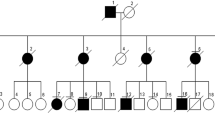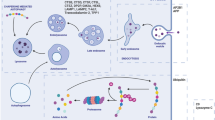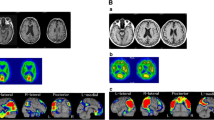Abstract
The clinical, neuroradiological, neuropathological and biochemical findings in four patients with primary progressive aphasia and tauopathy are described. The aphasic syndrome preceded by several years the appearance of other symptoms in every case. Asymmetrical apraxia with alien hand phenomenon occurred in one case. Frontotemporal symptoms occurred in three cases, but progressed to dramatic cognitive devastation in only one of these. Generalized dementia consistent with probable Alzheimer's disease (AD) developed with time in another. Cerebral computer tomography scans, magnetic resonance imaging and SPECT studies revealed marked asymmetries in one case, and showed nonspecific cerebral atrophy in the remaining ones. The neuropathological examination revealed typical corticobasal degeneration (CBD) in one case; CBD and AD in another; and atypical CBD, argyrophilic grain disease (AGD) and α-synucleinopathy consistent with Parkinson's disease in a third. Unique neuropathological findings were found in the remaining case. This was characterized by severe cerebral atrophy, marked neuronal loss in the cerebral cortex and abnormal tau deposition in neurons of the cerebral cortex, diencephalon and brain stem. Ballooned neurons, Pick bodies, generalized cortical neurofibrillary tangles and astrocytic plaques were absent. However, massive globular inclusions, containing phospho-tau, occurred in glial cells, mainly oligodendrocytes, in the white matter. Biochemical studies of frontal homogenates revealed four bands of 73/74, 68, 64 and 60 kDa of phosphorylated tau (using antibodies recognizing phospho-tau Thr181, Ser262 and Ser422) in the patient with AD and CBD, suggesting a predominant AD pattern in this case. Two bands of 68 and 64 kDa of phospho-tau were recovered in the sarkosyl-insoluble fraction in the other three cases. This pattern is similar to that found in CBD, progressive supranuclear palsy and AGD. Taken together, the present series further supports pure and combined CBD as causes of primary progressive aphasia, and they extend the hypothesis that primary progressive aphasia may be the initial symptom of distinct tauopathies.











Similar content being viewed by others
References
Arima K, Uesugi H, Fujita I, Sakurai Y, Oyanagi S, Andoh S, Izumiyama Y, Inose T (1994) Corticonigral degeneration with neuronal achromasia presenting with primary progressive aphasia: ultrastructural and immunocytochemical studies. J Neurol Sci 127:186–197
Arima K, Ueda K, Sunohara N, Arakawa K, Hirai S, Nakamura M, Tonozuka-Uehara H, Kawai M (1998) NACP/α-synuclein immunoreactivity in fibrillary components of neuronal and oligodendroglial cytoplasmic inclusions in the pontine nuclei in multiple system atrophy. Acta Neuropathol 96:439–444
Benson DF, Zaias BW (1991) Progressive aphasia: a case with post-mortem correlation. Neuropsychiatr Neuropsylchol Behav Neurol 4:215–223
Bergeron C, Pollanen M, Weyer L, Black S, Lang A (1996) Unusual clinical presentation of cortical-basal ganglionic degeneration. Ann Neurol 40:893–900
Bergeron C, Davis A, Lang AE (1998) Corticobasal ganglionic degeneration and progressive supranuclear palsy presenting with cognitive decline. Brain Pathol 8:355–365
Bigio EH, Lipton AM, Yen SH, Hutton ML, Baker M, Nacharaju P, White ChL, Davies P, Lin W, Dickson DW (2001) Frontal lobe dementia with novel tauopathy: sporadic multiple system tauopathy with dementia. J Neuropathol Exp Neurol 60:328–341
Boeve B, Dickson D, Duffy J, Bartleson J, Trenerry M, Petersen R (2003) Progressive nonfluent aphasia and subsequent aphasic dementia associated with atypical progressive supranuclear palsy. Eur Neurol 49:72–78
Braak H, Braak E (1989) Cortical and subcortical argyrophilic grains characterize a disease associated with adult onset dementia. Neuropathol Appl Neurobiol 15:13–26
Braak H, Braak E (1998) Argyrophilic grain disease: frequency of occurrence in different age categories and neuropathological diagnostic criteria. J Neural Transm 105:801–819
Braak H, Braak E (1999) Temporal sequence of Alzheimer's disease-related pathology. Cereb Cortex 14:475–512
Buée L, Delacourte A (1999) Comparative biochemistry of tau in progressive supranuclear palsy, corticobasal degeneration, FTDP-17 and Pick's disease. Brain Pathol 9:681–693
Buée L, Bussière T, Buée-Scherrer V, Delacourte A, Hof PR (2000) Tau isoforms, phosphorylation and role in neurodegenerative disorders. Brain Res Rev 33:95–130
Burn DJ, Jaros E (2001) Multiple system atrophy: cellular and molecular pathology. J Clin Pathol: Mol Pathol 54:419–426
Del Tredici K, Rüb U, Vos RAI de, Bohl JRE, Braak H (2002) Where does Parkinson disease pathology begin in the brain? J Neuropathol Exp Neurol 61:413–426
Delisle MB, Murrell JR, Richardson R, Trofatter JA, Rascol O, Soulages X, Mohr M, Calvas P, Ghetti B (1999) A mutation at codon 279 (N279 K) in exon 10 of the tau gene causes tauopathy with dementia and supranuclear palsy. Acta Neuropathol 98:62–77
Dickson DW (2002) Progressive supranuclear palsy and corticobasal degeneration. In: Hof PR, Mobbs CV (eds) Functional neurobiology of aging. Academic Press, San Diego, pp 165–171
Dickson DW, Yen SH, Suzuki KI, Davies P, Garcia JH, Hirano A (1986) Ballooned neurons in select neurodegenerative diseases contain phosphorylated neurofilament epitopes. Acta Neuropathol 71:216–223
Dickson DW, Lin WL, Liu WK, Yen SH (1999) Multiple system atrophy: a sporadic synucleinopathy. Brain Pathol 9:721–732
Dickson DW, Bergeron C, Chin SS, Duyckaerts C, Horoupian D, Ikeda K, Jellinger K, Lantos PL, Lippa CF, Mirra SS, Tabaton M, Vonsattel JP, Wakabayashi K, Litvan I (2002) Office of rare diseases neuropathologic criteria for corticobasal degeneration. J Neuropathol Exp Neurol 61:935–946
Feany MB, Dickson DW (1995) Widespread cytoskeletal pathology characterizes corticobasal degeneration. Am J Pathol 146:1388–1396
Feany MB, Dickson DW (1996) Neurodegenerative disorders with extensive tau pathology: a comparative study and review. Ann Neurol 40:139–148
Ferrer I, Barrachina M, Tolnay M, Rey MJ, Vidal N, Carmona M, Blanco R, Puig B (2003) Phosphorylated protein kinases associated with neuronal and glial tau deposits in argyrophylic grain disease. Brain Pathol 13:62–78
Ferrer I, Pastor P, Rey MJ, Muñoz E, Puig B, Pastor E, Oliva R, Tolosa E (2003) Tau phosphorylation and kinase activation in familial tauopathy linked to delN296 mutation. Neuropathol Appl Neurobiol 29:23–34
Gibb WRG, Luthert PJ, Marsden CD (1989) Corticobasal degeneration. Brain 116:281–302
Goedert M, Spillantini MG, Cairns NJ, Crowtler RA (1992) Tau proteins of Alzheimer paired helical filaments: abnormal phosphorylation of all six brain isoforms. Neuron 8:159–168
Goedert M, Spillantini MG, Davis SW (1998) Filamentous nerve cell inclusions in neurodegenerative diseases. Curr Opin Neurobiol 8:619–632
Graff-Radford NR, Damasio AR, Hyman BT, Hart MN, Tranel D, Damasio H, Van Hoesen GW (1990) Progressive aphasia in a patient with Pick's disease: neuropsychological, radiologic, and anatomic study. Neurology 40:620–626
Green J, Moris JC, Sandson J, McKeel DW, Miller JW (1990) Progressive aphasia: a precursor of global dementia? Neurology 40:423–429
Holland AL, McBurney DH, Moossy J, Reinmuth OM (1985) The dissolution of language in Pick's disease with neurofibrillary tangles: a case study. Brain Lang 24:36–58
Hutton M, Lendon CL, Rizzu P, et al (1996) Association of a missense and 5'splice-site mutations in tau with the inherited dementia FTDP-17. Nature 393:702–705
Ikeda K, Akiyama H, Kiondo H, Haga C (1995) A study of dementia with argyrophilic grains. Possible cytoskeletal abnormality in dendrospinal portion of neurons and oligodendroglia. Acta Neuropathol 89:409–414
Ikeda K, Akiyama H, Iritani S, Kase K, Arai T, Niizato K, Kuroki N, Kosaka K (1996) Corticobasal degeneration with primary progressive aphasia and accentuated cortical lesion in superior temporal gyrus: case report and review. Acta Neuropathol 92:534–539
Ingram EM, Spillantini MG (2002) Tau gene mutations: dissecting the pathogenesis of FTDP-17. Trends Mol Med 8:555–562
Iseki E, Matsumura T, Marui W, Hino H, Odawara T, Sugiyama N, Suzuki K, Sawada H, Arai T, Kosaka K (2001) Familial frontotemporal dementia and parkinsonism with a novel N296H mutation in exon 10 of the tau gene and a widespread tau accumulation in the glial cells. Acta Neuropathol 102:285–292
Jellinger KA (1998) Dementia with grains (argyrophilic grain disease). Brain Pathol 8:377–386
Judkins AR, Forman MS, Uryu K, Hinkle DA, Asbury AK, Lee VMY, Trojanowski JQ (2002) Co-occurrence of Parkinson's disease with progressive supranuclear palsy. Acta Neuropathol 103:526–530
Kempler D, Metter EJ, Riege WH, Jackson CA, Benson DF, Hanson WR (1990) Slowly progressive aphasia: three cases with language, memory, CT and PET data. J Neurol Neurosurg Psychiatry 53:987–993
Kertesz A, Muñoz DG (2003) Primary progressive aphasia and Pick complex. J Neurol Sci 206:97–107
Kertesz A, Hudson L, Mackenzie IR, Muñoz DG (1994) The pathology and nosology of primary progressive aphasia. Neurology 44:2065–2072
Kertesz A, Martínez-Lage P, Davidson W, Muñoz DG (2000) The corticobasal degeneration syndrome overlaps progressive aphasia and frontotemporal dementia. Neurology 55:1368–1375
Kinoshita A, Tomimoto H, Tachibana N, Suenaga T, Kawamata T, Kimura T, Akiguchi I, Kimura J (1996) A case of primary progressive aphasia with abnormally ubiquitinated neurites in the cerebral cortex. Acta Neuropathol 92:520–524
Kirschner HS, Tanridag O, Thurman L, Whetsell WO (1987) Progressive aphasia without dementia: two cases with spongiform degeneration. Ann Neurol 22:527–532
Knopman DS (1993) Overview of dementia lacking distinctive histology: pathological designation of a progressive dementia. Dementia 4:132–136
Komori T (1999) Tau-positive glial inclusions in progressive supranuclear palsy, corticobasal degeneration and Pick's disease. Brain Pathol 9:663–679
Lang AE (1992) Cortical basal ganglionic degeneration presenting with progressive loss of speech output and orofacial dyspraxia. J Neurol Neurosurg Psychiatry 55:1101
Lantos PL (1998) The definition of multiple system atrophy: a review of recent developments. J Neuropathol Exp Neurol 57:1099–1111
Lee VMY, Goedert M, Trojanowski JQ (2001) Neurodegenerative tauopathies. Annu Rev Neurosci 24:1121–1159
Lippa CF, Cohen R, Smith TW, Drachman DA (1991) Primary progressive aphasia with focal neuronal achromasia. Neurology 41:882–886
Litvan I, Grimes DA, Lang AE (2000) Phenotypes and prognosis: clinicopathological studies of corticobasal degeneration. Adv Neurol 82:183–196
Lowe J, Errington DR, Lennox G, Pike I, Spendlove I, Landon M, Mayer RJ (1992) Ballooned neurons in several neurodegenerative diseases and stroke contain αB-crystallin. Neuropathol Appl Neurobiol 18:341–350
Mandell AM, Alexander MP, Carpenter S (1989) Creutzfeldt-Jakob disease presenting as isolated aphasia. Neurology 39:55–58
Martinez-Lage P, Muñoz DG (1997) Prevalence of diseases associated with argyrophilic grains of Braak. J Neuropathol Exp Neurol 56:157–164
Mesulam MM (1982) Slowly progressive aphasia without generalized dementia. Ann Neurol 11:592–598
Mesulam MM (1987) Primary progressive aphasia—differentiation from Alzheimer's disease. Ann Neurol 22:533–534
Mimura M, Oda T, Tsuchiya K, Kato M, Ikeda K, Hori K, Kashima H (2001) Corticobasal degeneration presenting with nonfluent primary progressive aphasia: a clinicopathological study. J Neurol Sci183:19–26
Mochizuki A, Ueda Y, Komatsuzaki Y, Tsuchiya K, Arai T, Shoji S (2003) Progressive supranuclear palsy presenting with primary progressive aphasia. Clinicopathological report of an autopsy. Acta Neuropathol 105:610–614
Mori H, Yoshimura M, Tomonaga M, Yamanouchi H (1986) Progressive supranuclear palsy with Lewy bodies. Acta Neuropathol 71:344–346
Neary D, Snowden JS, Mann DM (1993) Familial progressive aphasia: its relationship to other forms of lobar atrophy. J Neurol Neurosurg Psychiatry 56:1122–1125
Novak M, Jakes PC, Edwards C, Milstein C, Wischik CM (1991) Difference between the tau protein of Alzheimer paired helical filament core and normal tau revealed by epitope analysis of monoclonal antibodies 423 and 7.51. Proc Natl Acad Sci USA 88:5837–5841
Pogakar S, Williams RS (1984) Alzheimer's disease presenting as slowly progressive aphasia. RI Med J 67:181–185
Rebeiz JJ, Kolodny EH, Richardson EP (1968) Corticodentatonigral degeneration with neuronal achromasia. Arch Neurol 18:20–33
Sakurai Y, Hashida H, Uesugi H, Arima K, Murayama S, Bando M, Iwata M, Momose T, Sakuta M (1996) A clinical profile of corticobasal degeneration presenting as primary progressive aphasia. Eur Neurol 36:134-137
Scheltens P, David R, Kampshorst W (1994) Pathologic findings in a case of primary progressive aphasia. Neurology 44:279–282
Schneider JA, Watts RL, Gearing M, Brewer RP, Mirra SS (1997) Corticobasal degeneration: neuropathological and clinical heterogeneity. Neurology 48:959–969
Schwarz M, De Blesser R, Poeck K, Weis J (1998) A case of primary progressive aphasia. A 14-year follow-up study with neuropathological findings. Brain 121:115–126
Shuttleworth EC, Yates AJ, Paltan-Ortiz JD (1985) Creutzfeldt-Jakob disease presenting as progressive aphasia. J Natl Med Assoc 77:649–655
Snowden JS, Neary D, Mann DMA, Goulding PJ, Testa HJ (1992) Progressive language disorder due to lobar atrophy. Ann Neurol 31:174–183
Spillantini MG, Goedert M, Crowther RA, Murrell JR, Farlow MR, Ghetti B (1997) Familial multiple system tauopathy with presenile dementia: a disease with abundant neuronal and glial tau filaments. Proc Natl Acad Sci USA 94:4113–4118
Spillantini MG, Crowther RA, Jakes R, Cairns NJ, Lantos PL, Goedert M (1998) Filamentous α-synuclein inclusions link multiple system atrophy with Parkinson's disease and dementia with Lewy bodies. Neurosci Lett 251:205–208
Takahashi T, Amano N, Hanihara T, Nagatiomo H, Yagishita S, Itoh Y, Yamaoka K, Toda H, Tanabe T (1996) Corticobasal degeneration: widespread argentophilic threads and glia in addition to neurofibrillary tangles. Similarities of cytoskeletal abnormalities in corticobasal degeneration and progressive supranuclear palsy. J Neurol Sci 138:66–77
Togo T, Cookson N, Dickson DW (2001) Argyrophilic grain disease: neuropathology. Frequency in a dementia brain bank and lack of relationship with apolipoprotein E. Brain Pathol 12:45–52
Togo T, Sahara N, Yen SH, Cookson N, Ishizawa T, Hutton M, De Silva R, Lees A, Dickson DW (2002) Argyrophilic grain disease is a sporadic 4-repeat tauopathy. J Neuropathol Exp Neurol 61:547–556
Tolnay M, Probst A (1998) Ballooned neurons expressing α-B-crystallin as a constant feature of the amygdala in argyrophilic grain disease. Neurosci Lett 246:165–168
Tolnay M, Schwietert M, Monsch AU, Stahelin HB, Langui D, Probst A (1997) Argyrophilic grain disease: distribution of grains in patients with and without dementia. Acta Neuropathol 94:353–358
Tolnay M, Sergeant N, Ghestem A, Chalbot S, Vos RAI de, Jansen Steur ENH, Probst A, Delacourte A (2002) Argyrophylic grain disease and Alzheimer's disease are distinguished by their different distribution of tau protein isoforms. Acta Neuropathol 104:425–434
Tu PH, Galvin JE, Baba M, Giasson B, Tomita T, Leigh S, Nakajo S, Iwatsuboto T, Trojanowski JQ, Lee VMY (1998) Glial cytoplasmic inclusions in white matter oligodendrocytes of multiple system atrophy brains contain insoluble α-synuclein. Ann Neurol 44:415–422
Turner RS, Kenyon LC, Trojanowski JQ, Gonatas N, Grossman M (1996) Clinical, neuroimaging, and pathologic features of progressive nonfluent aphasia. Ann Neurol 39:166–173
Uchihara T, Mitani K, Mori H, Kondo H, Yamada M, Ikeda K (1994) Abnormal cytoskeletal pathology peculiar to corticobasal degeneration is different from that of Alzheimer's disease or progressive supranuclear palsy. Acta Neuropathol 88:379–383
Wakabayashi K, Oyanagi K, Makifuchi T, Ikuta F, Honna A, Honna Y, Horikawa Y, Tokiguche S (1994) Corticobasal degeneration. Etiopathological significance of the cytoskeletal alterations. Acta Neuropathol 87:545–553
Wakabayashi K, Hayashi S, Kakita A, Yamada M, Toyoshima Y, Yoshimoto M, Takahashi H (1998) Accumulation of α-synuclein/NACP is a cytopathological feature common to Lewy body disease and multiple system atrophy. Acta Neuropathol 96:445–452
Wechsler AF, Verity MA, Rosenschein S, Fried I, Scheibel AB (1982) Pick's disease. A clinical, computed tomographic, and pathological study with Golgi impregnation observations. Arch Neurol 39:287–290
Yamanouchi H, Budka H, Vass K (1986) Unilateral Creutzfeldt-Jakob disease. Neurology 36:1517–1520
Yoshimura I, Yoshimura N, Hayashi S, Tasaki H, Kukushima Y (1995) A clinicopathological study of senile dementia presenting as progressive sensory aphasia: a variant of corticobasal degeneration. Jpn J Clin Psychiatry 24:193–200
Zhukareva V, Vogelsberg-Ragaglia V, Van Deerlin VMD, Bruce J, Shuck T, Grossman M, Clark CM, Arnold SE, Masliah E, Galasko D, Trojanowski JQ, Lee VMY (2001) Loss of brain tau defines novel sporadic and familial tauopathies with frontotemporal dementia. Ann Neurol 49:165–175
Acknowledgements
This work was supported in part by EU contract QLRI-CT-2000-66, CICYT SAF-2001-4681-E and FIS P1020004. We greatly acknowledge Dr. J. Avila his comments and criticism. We wish to thank M. Barrachina for help with the figures and T. Yohannan for editorial assistance.
Author information
Authors and Affiliations
Corresponding author
Rights and permissions
About this article
Cite this article
Ferrer, I., Hernández, I., Boada, M. et al. Primary progressive aphasia as the initial manifestation of corticobasal degeneration and unusual tauopathies. Acta Neuropathol 106, 419–435 (2003). https://doi.org/10.1007/s00401-003-0756-4
Received:
Revised:
Accepted:
Published:
Issue Date:
DOI: https://doi.org/10.1007/s00401-003-0756-4




